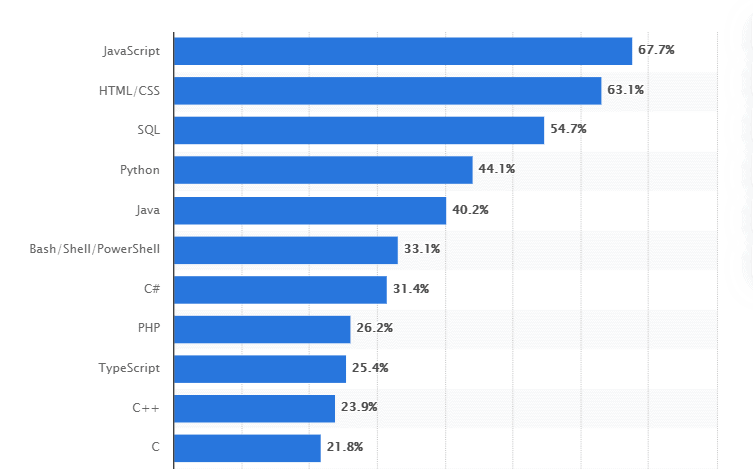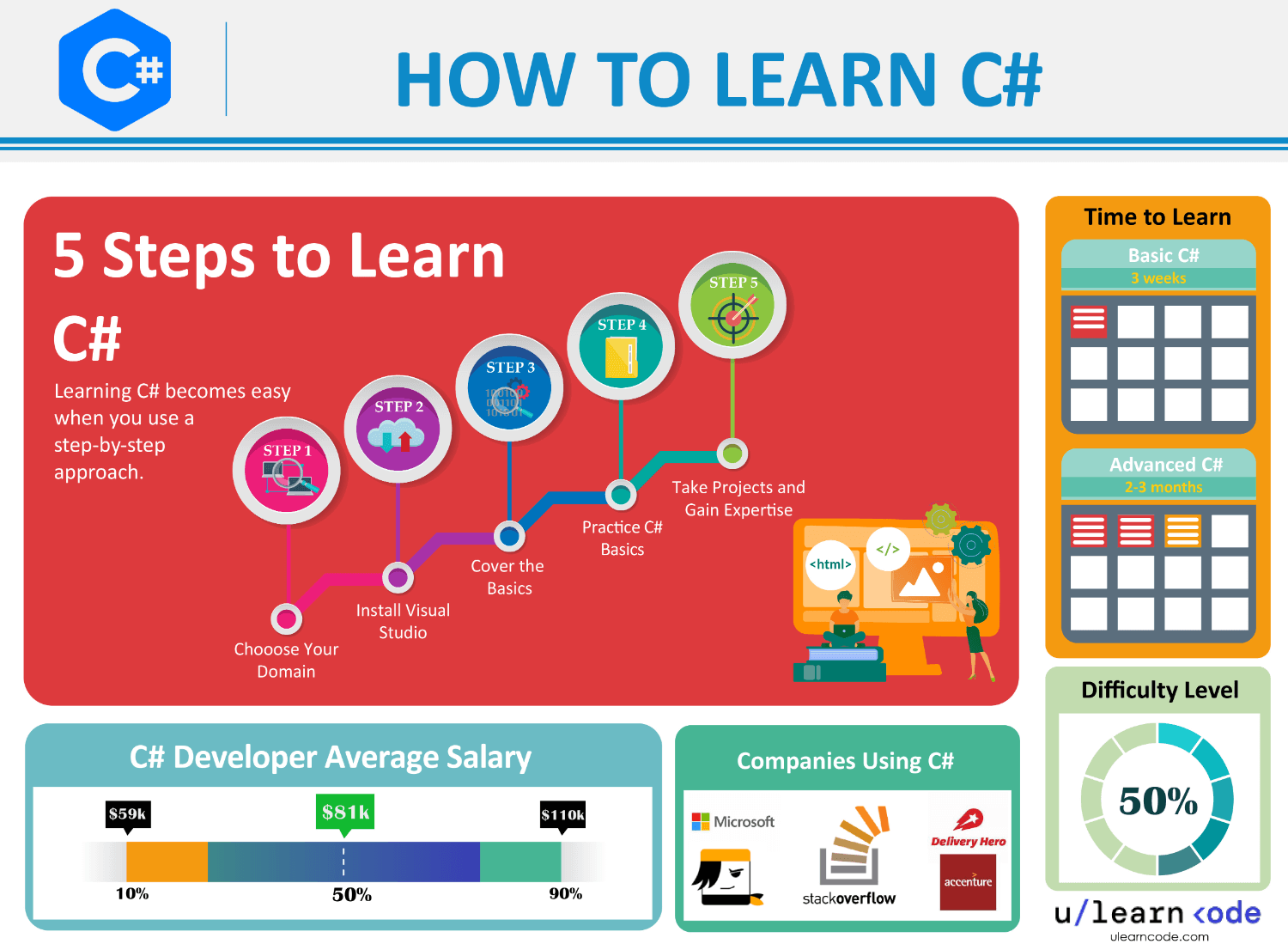Contents
C# is a general-purpose programming language designed and developed by the Microsoft organization. The language was created to support Microsoft’s .NET framework, but it quickly became an international standard language approved by the Ecma.
C# has a range of applications, but it is mainly used for creating desktop and web applications. The language is extremely compatible with .NET framework and that is why it has the ability to develop top-tier applications for Windows.

According to Statista, C# was 7th most used programming language amongst developers in 2020. C# language developers are in high demand, as Microsoft itself continues to support the language with its powerful framework.
Moreover, C# is a great choice for complete beginner programmers but how hard is it to learn? The answers to all of these queries are in this article.
Is C# Hard to Learn?
C# is known as a high-level language, when developing the language Microsoft tried to keep the basic concepts simple for beginner programmers but despite this we cannot conclude that C# is an easy choice.
If we compare C# with C++ then the difference is clear, C++ is a far more complex language with object-oriented concepts whilst C# operates with a simple class hierarchy. This makes the language easy to learn for beginner developers who are just starting out.
Visual Studio IDE makes C# learning even more enjoyable due to its range of functionalities that mix easily with well-managed class hierarchies.
The language itself is simple if you can understand its basic concepts. However, many people get overwhelmed by its .NET library and they start relying on it instead of dedicating time to learning the basic logic of the language.
In conclusion, C# is an essential and easy to learn language for beginners, who can move on to pair it with the latest Visual Studio, allowing them to create highly functional web applications for Windows.
However, it is important to never rely only on Windows and they should ensure to also explore Linux in order to maximize their development potential.
How Long Does It Take to Learn C#?
Beginner developers typically take 2-3 months to learn the basic concepts of C#. Whilst this period can be minimized if you have any prior experience with programming, it normally takes around a year to become a skilled developer and over 5 years to become C# guru.
So why is C# actually a good choice for novices? Well, firstly the language syntax is not overly complex and many of the underlying concepts such as arrays and conditional statements can be easily learned.
If you have any experience with other programming languages such as Java, then you can ordinarily learn basic C# in around a week. There are a variety of principles and concepts that are similar in both languages such as garbage collection and general-purpose syntax.
It is necessary to define your goals, outlining whether you want to move into app development or game development.
Once you have a strong grip on the basic concepts and you have practiced repeatedly to solve various problems then you can move onto real tasks where you have to solve specific problems for developing the desired application.
5 Steps to Learn C#

We have established the difficulty level of the C# language but what is the correct roadmap to efficiently learning C# without clutter and confusion? Here is a 5-step method that will assist you till the end:
Step 1: Choose Your Domain
It is mandatory to choose a specific domain before you start learning C#. The language has a variety of applications, but it is mainly employed in these two domains:
- Web Application Development
- Game Development
C# developers mostly work with Windows .NET framework and they develop noteworthy applications for their respective OS. On the other hand, game developers also prefer C# language, and they implement it within Unity game engine for this purpose.
So, you must make your domain selection dependent on which specific frameworks and IDEs will allow you to easily develop your desired applications.
Step 2: Install Visual Studio
Undoubtedly, Visual Studio is an outstanding IDE for C# developers. Visual Studio also facilitates a number of other languages, but this IDE is mainly used by C# developers.
Furthermore, Visual Studio has an excellent code editor that highlights your syntax along with a code completion feature facilitated by IntelliSense where functions, methods and loops are automatically written as you proceed with the code.
Moreover, there are various design, debugging and other tools such as:
- object browser
- solution explorer
- data explorer
- text generator frameworks.
Step 3: Cover the Basics
Once you have chosen your domain and your Visual Studio IDE is ready, it is time to start with the basics of C#. The basic functions are not complex at all as the language has an easily legible structure without many advanced concepts.
Aside from the best C# courses, there are a few other sources which can help you to learn C# fast. Such sources include YouTube and other social platforms. Here are a few of the best YouTube channels that teach C#:
- freeCodeCamp.org — C# Full Course for Beginners
- Programming with Mosh — C# .NET Tutorials
- Dani Krossing — C# Tutorials by Dani
- Kudvenkat — C# Tutorials for Beginners
Step 4: Practice C# Basics
The C# language is based upon a typical .NET framework and it is likely possible that you will engage with this application framework library to code different applications for Windows platform.
If you are interested in application development, then you should use a suitably compatible IDE such as Visual Studio to test your skills.
If your passion is game development, then you will probably be dealing with an entirely different environment such as Unity. Where possible start practicing and create simple games to allow you to practice your basic C# concepts.
Step 5: Take Projects & Gain Expertise
Once you have some experience dealing with basic applications and games then it is time to begin your professional career.
You can offer your skills on a freelance basis through Upwork to gain experience in finishing small-scale projects before gradually moving onto more complex ones once you gain further expertise.
Once you have 2-3 years of experience in C# then you can seek out full time employment in your field as most companies require experienced developers as opposed to fresh learners. Hence, freelancing is a great way to climb the career ladder.
Conclusion
Unlike other languages, C# is not greatly diversified. There are limited applications, but the learning curve of C# is easy in comparison to other languages such as Java and C++. Overall, C# is a great option for all novice programmers due to its simple class hierarchy and basic core concepts.